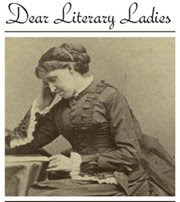
Dear Literary Ladies,
Is there anything to be gained by reading reviews of your books? For most authors, it's hard to ignore reviews; first of all, one is curious, but also, with google alerts and such, everything's in your face 24/7. What was your experience with reviews, and did you learn anything of value from them?
Talk of reviews! I subscribed to a clipping bureau and they come in shoals every day. So far I have received sixty-six of which sixty were kind and flattering beyond my highest expectations; of the remaining six two were a mixture of praise and blame, two were contemptuous and positively harsh. However, the nice ones are so much in the majority that these adverse ones do not worry me much. One criticism was correct—it said the ending of the book was “too poor and commonplace” to match the “freshness and originality” of the first two thirds. One denounced the heroine as “impossible, mawkish and tiresome.” . . .
On the other hand a favorable critic called her “charming” “vivid” “original,” “one of the most delightful characters in juvenile fiction” etc. etc. One thing surprises me in the reviews and one thing disappoints me. I am surprised that they seem to take the book so seriously—as if it were meant for grown-up readers and not merely for girls. The disappointment come in this: —I had hoped to learn something from the reviews. I know the book must have faults which its author could not perceive and I expected the reviews would point them out. But there is no agreement. What one critic praises as the most attractive feature in the book another condemns as its greatest fault—and there I am no wiser than before.
—L.M. Montgomery, from a letter, March 19, 1906
Do you learn anything from reviews of your books?
Are women authors held to different standards than men?

A reprise of an earlier post—in conjunction with sharing this great YouTube video portraying the Brontë Sisters Power Dolls!
Dear Literary Ladies,
Not one of the top ten books of 2009 according to Publishers Weekly was by a female writer, and only about a third of the books on their extended best book lists were by women. Do you think women writers are (or should be) judged by different standards than men?
To value praise or stand in awe of blame we must respect the source whence the praise and blame proceed, and I do not respect an inconsistent critic. He says, “if Jane Eyre be the production of a woman, she must be a woman unsexed.’
In that case the book is an unredeemed error and should be unreservedly condemned. Jane Eyre is a woman’s autobiography, by a woman it is professedly written. If it is written as no woman would write, condemn it with spirit and decision—say it is bad, but do not eulogise and then detract. I am reminded of The Economist. The literary critic of that paper praised the book if written by a man, and pronounced it ‘odious’ if the work of a woman.
To such critics I would say, ‘To you I am neither man nor woman—I come before you as an author only. It is the sole standard by which you have a right to judge me—the sole ground on which I accept your judgment.’
—Charlotte Brönte, from a letter, August 16, 1849



